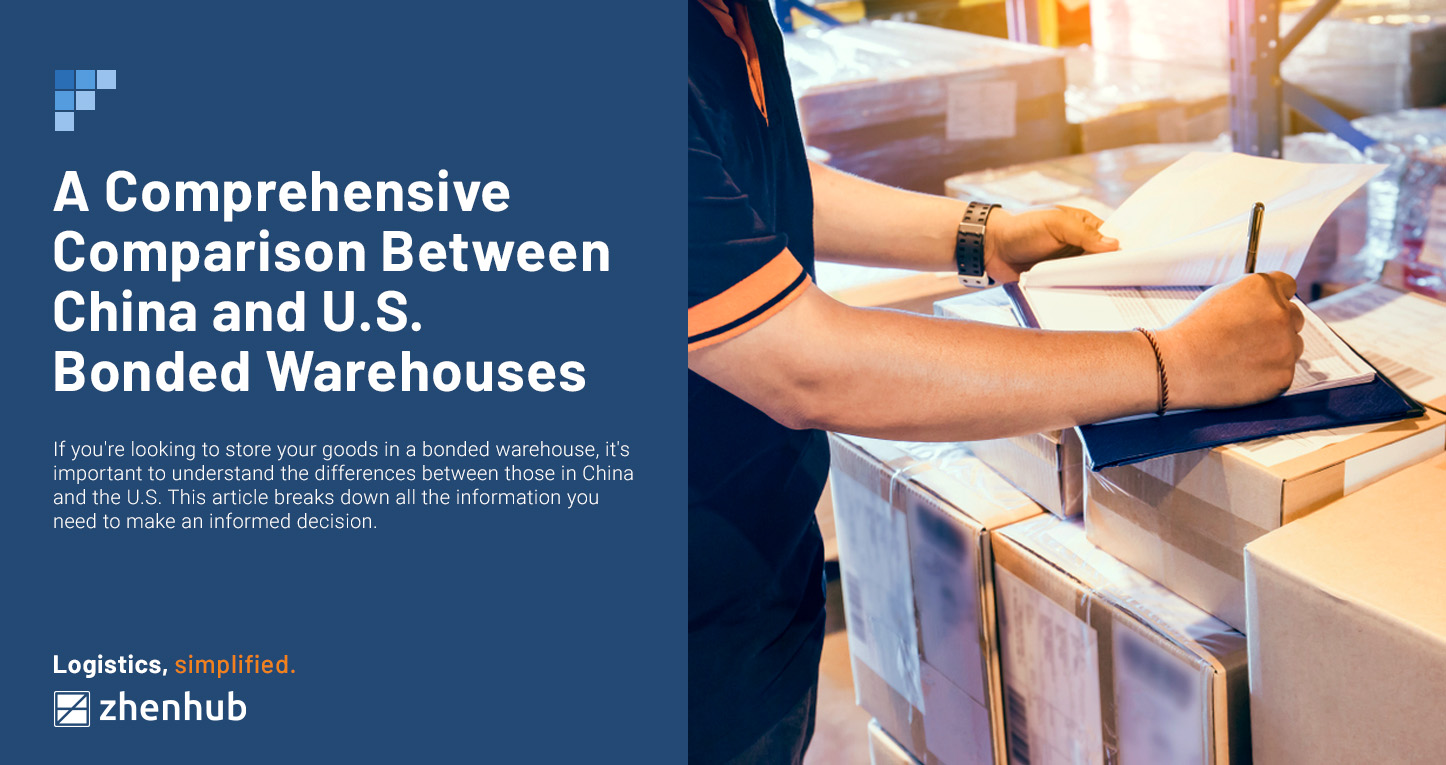
A Comprehensive Comparison Between China and U.S. Bonded Warehouses
Time to read: 6 minutes
In international shipping, warehouses are vital for businesses to succeed. Bonded warehouses are specialized storage solutions for specific enterprises.
This article compares and contrasts the bonded warehouses in China and the United States. You’ll understand the benefits and drawbacks of each type so you can make an informed decision on where to store your inventory.
If your business has operations abroad, then it is likely you’ve already encountered bonded warehouses. They serve the same purpose as normal, un-bonded warehouses. A customs bonded warehouse is a secure location to store, export, and import goods.
Warehouses are great for business operations because they keep your inventory in order and facilitate fulfillment. Nowadays, such buildings are at the forefront of a digital transformation, allowing vendors seamless management through apps, software, and even their phones.
Utilizing warehouses for business growth is essential. Any merchant seeking to attain long-term growth and scalability should consider the use of warehouses seriously.
Why Use a Bonded Warehouse?
As you know, warehouses are where goods are kept and processed before delivery. In the case of bonded warehouses, these buildings can either be owned by the government or a private entity. Usually, when an importer receives goods from another country, they must immediately pay taxes and customs duties. Importers must also have the goods they received duly inspected upon arrival at their warehouse, regardless of their destination.
The major difference in bonded warehouses is that the goods can be received and held until duties and inspections get done by customs agents. In most cases, payment of taxes gets deferred until customers buy the items. Doing this can lead to cost savings and added convenience for potential buyers.
Companies can also manage import taxes better by using bonded warehouses. You can maintain inventory in bonded storage to avoid a significant upfront tax payment if business owners don’t sell imported goods immediately.
After that, importers can keep the funds and use them however they see fit. Since appropriate tariffs are only paid when the goods are exported after being sold, you can have greater financial flexibility by offsetting duty payments from the sale of the goods.
Stock with low or erratic demand can also be kept for extended periods in customs-bonded warehouses. Companies can move their products for shipping once the need for it increases. If it doesn’t, then some bonded warehouses offer duty-free re-exportation.
Warehouse authorities can also offer you a bond protecting you from monetary loss once a shipment is released and after settling the tax fees
Bonded warehouses are great for risk management. They are the preferred choice for storing restricted goods. The paperwork and regulatory requirements for importing restricted items are significantly higher than for regular commodities.
Additionally, you can only keep regulated items in a warehouse for a certain amount of time before it needs documentation — which can be challenging for importers. Unlike duty deferment, importers can hold restricted goods for up to five years in customs bonded warehouses since they are exempt from the probationary term.
Bonded warehouses maintain strategic locations, allowing you to hold stock closer to where your buyers are. The warehouse staff can also handle your labeling, testing, and packaging on your behalf.
The Differences between Bonded Warehouses in China and the US
Adopting the bonded warehouse model is excellent for flexibility in your finances and administrative tasks when serving different international markets. China and the United States are two economic powerhouses home to major manufacturing plants across various industries.
Cross-border selling is made more accessible due to increasing popularity of eCommerce. Gaining a foothold in these countries can easily be done by contracting the services of a bonded warehouse. That said, China and the US have very different import and export regulations, so it is important to take note of their differences.
Bonded Warehouses in China
Free trade zones (FTZ) are where almost all bonded warehouses in China are. As of April 2020, 105 special economic zones are scattered across 30 Chinese provinces. You must use authorized trucks to transport goods into a bonded area. Depending on your warehouse’s region, it may be an added expense. Pre-declaration is necessary, and companies entering these areas must report price changes to customs.
Registration is simple and fast. And many warehouses already have streamlined processes that allow for efficient customs clearance. Moving goods between FTZs and abroad is possible without incurring additional taxes and charges from Chinese customs.
The “Tax Policy for Cross-Border eCommerce Retail Imports,” states that customers who buy items worth more than a certain amount must pay taxes, such as customs and consumption tax. Customs in the area have access to digital data on these purchases. Currently, single transaction purchases under 5,000 RMB are entitled to a reduced rate of 70% VAT and 0% duty. The same applies to a total annual spend of 26,000 RMB for a single person.
However, if Chinese customs cannot access the electronic records of an imported good, those items will be subject to a different set of parcel tax rates. These rates go for 13%, 20%, and 50%, depending on the bulk and nature of the items. Exemptions are available for payable tax amounts under 50 RMB.
Chinese authorities have published the “Positive List,” a directory of all items and goods businesses can sell through cross-border eCommerce. Only properly tagged products with their tariff code can be distributed, sold, and stored.
Bonded Warehouses in the US
Bonded warehouses in the US are under the jurisdiction of US Customs and Border Protection (CBP). These locations all comply with the Code of Federal Regulations (CFR), a codification of the general and permanent rules that all business entities must adhere to.
A major advantage of US bonded warehouses is the period in which items can stay in storage. The CFR sets this up to 5 years from the date of importation. It’s worth noting that it can also be manipulated and undergo manufacturing without the need to pay duties.
There are eleven classes of bonded warehouses, all categorized by what items they can store.
- Class 1 – Properties or spaces that can be owned or leased by the US government. They are primarily used for special requests by port authorities. Merchandise that the CBP also seizes is held here for inspection.
- Class 2 – A private warehouse used by an importer to hold goods and items held by the owner.
- Class 3 – A public warehouse exclusively used to store imported goods.
- Class 4 – Storage for heavy and bulky items and containers for liquid merchandise. Buildings and enclosures used to import animals also fall under this classification.
- Class 5 – Facilities and buildings used to store grain.
- Class 6 – Bonded warehouses are used to manufacture bonded goods meant for exportation. These products can include imported materials or materials subject to internal tax in their production. Imported tobacco meant for domestic consumption and exportation also qualify for this classification.
- Class 7- Facilities equipped with smelting and refining imported metal bearing materials for exportation and domestic markets.
- Class 8 – A facility involved with cleaning, sorting, and repacking imported merchandise. The CBP strictly monitors manufacturers not covered under Class 8, including all services but at the proprietor’s expense.
- Class 9 – Duty-free stores.
- Class 10 – Bonded warehouses that store duty-free merchandise for sale aboard aircraft during international travel. It doesn’t cover items for sale in duty-free stores.
- Class 11 – Storage for General Order (G.O.) items. G.O. is any merchandise not claimed or entered for 15 days after arrival in the US.
All commodities except for perishables and explosives other than firecrackers are subject to duty. Companies may use the retail sales area of a warehouse to store any commodities, excluding duty-free items.
People leaving the US are free to purchase the products. All the goods that enter the warehouse must be accountable. The creation of an inventory list and routine record auditing is required.
Domestic and bonded products must be kept apart. They are not permitted to mix with unbonded commodities.
The applicant must send a written request for the establishment of a bonded warehouse to the local CBP port director. They must also describe the site and specify the type of warehouse they wish to build.
The application must specify whether the warehouse is to be used exclusively for storing or treating goods belonging to the applicant. or if it is to be used as a public bonded warehouse, except Class 2 and Class 7 warehouses.
Choosing the Right Bonded Warehouse for Your Business
When you import a lot of items from another country, costs can be high due to additional customs and taxes on top of the price of the goods and shipping. Bonded warehouses allow retailers to choose when they pay by releasing the merchandise as needed instead of spending it all at once. As a result, importing bulk goods for your eCommerce firm is far less expensive.
Bonded warehouses are frequently the best option for keeping prohibited items like alcoholic beverages, animal byproducts, and specific food items The paperwork and additional regulatory restrictions make importing restricted goods challenging.
Many direct-to-consumer brands prefer using bonded warehouses as they expedite the processing of goods at customs with minimal risk. When choosing a partner bonded warehouse, consider the location and the markets it serves. If it brings you closer to your customers, you may enjoy faster shipping times and more comprehensive fulfillment services. Carrier rates may also be more favorable.
Choose a warehouse that is well established and connected locally. Safety and security are also major factors to consider. At the end of the day, you must be familiar with the laws and regulations of the bonded warehouse, whether it’s China or the USA. Working with a bonded warehouse should make storing and transporting international goods as hassle-free as possible.
ZhenHub lets you expand your market internationally with globally-connected eCommerce fulfillment centers built for multi-platform integrations. Our network of strategically-located warehouses helps you reduce storage and shipping costs. Sign-up at our website now and get instant access to our logistics software solutions.


